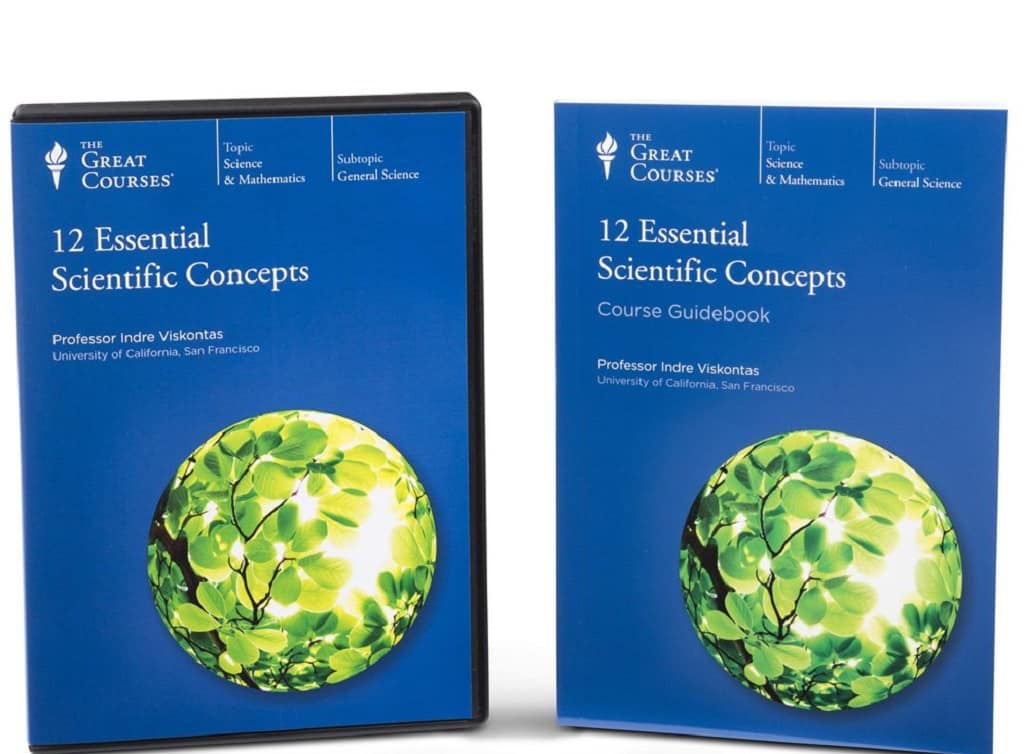12 Essential Scientific Concepts Audiobook by Indre Viskontas

Science is such a vast arena of knowledge that people looking for a better grasp of its secrets often wonder where to begin. The answer: with the essentials. Now, finally satisfy your desire for scientific inquiry in a way that makes this enormous field accessible, understandable, and undeniably captivating.
Professor Viskontas boils down the scientific world into 12 key concepts every educated person should know. Devoting two lectures to each concept to give you more time to engage with it, her 24-lecture series is an engaging and enlightening introduction to everything from the behavior of subatomic particles to the latest theories about the Big Bang.
Throughout, you’ll get accessible looks at key building blocks of scientific knowledge, including brain plasticity, fluid mechanics, electromagnetism, genetics, quantum theory, emergence, evolution, thermodynamics, the Big Bang, and the nature of matter. Each concept is presented in a clear, concise way that will inform and delight you, and that will give you the opportunity to probe the invisible life of living cells, visit the universe seconds after its birth, and much more.
Concepts that may have eluded you in school, that you may not be familiar with, or that you simply never appreciated for their intricate beauty are now brought to vivid life in a way that sticks.
Welcome to the world of science – reduced to its powerful essence.
Plot Summary
Lecture 1 – The Miracle of Life was interesting, but not very satisfying. She spouted a lot of good & interesting scientific facts, but never got to the meat of matter, the question she started with – What is life? She describes how water & carbon work together creating amino acids, which form peptides, then polypeptides, & finally proteins. She mentions sugars, lipids, hormones, & more, but doesn’t really discuss the how the energy is stored & released. She mentions DNA, but never mentions a current thought that spreading DNA is one of the purposes of life. She barely mentions viruses & never asks the hard question of whether they are alive or not. Maybe in the next lecture?
Lecture 2 – The Organization of Life gets into the basics of a cell & she does a wonderful job explaining what some of the parts do. She does mention viruses, but without any real discussion as to whether they’re alive or not. Again interesting, but she seems to have lost her point because we jump from viruses to the human brain & a discussion of neurons. Wow! OK, the brain is highly organized, but our versions of how subjects are related seems to differ.
Lecture 3 – Evolution:The Tireless Tinkerer was well done. Her thumbnail of Darwin was very good. I like how she says nature tinkers & distinguishes that from design. In another book I recently read, the point was made better by stressing 2 points: First by not the ‘fittest’, but the ‘good enough’ AND at spreading copies of its DNA. She pretty much says the same thing, but not as clearly.
Lecture 4 – Other Mechanisms of Evolution She gets into the subtle differences in some of the methods of evolution along with just enough statistics to back things up without losing me. Her illustration of a jar of marbles for genetic drift (random choice of 2 colors) was pretty good. I loved her explanation of the Hardy-Weinberg Principle & its importance. Then she used that to ground genetic variation.
Lecture 5 – DNA and Heritability Mendelian inheritance with a thumbnail of Gregor was well done. Then she really digs into DNA in detail, a bit more than I needed, but it was all interesting & understandable, some new to me, & the rest a good refresher. It also set the stage well for the next lecture.
Lecture 6 – Epigenetics, Mutations, and Gene Insertion was really interesting because she outlined how environmental factors can affect our genetics. Nature versus nature is not a valid question because they’re too intertwined with too many variables. I wish she’d gotten into GMOs & their various types/methods, though. A lot of this was new to me & I may listen to this lecture again.
Lecture 7 – The Illusion of Coherence – How We See was a bit of whiplash again as we suddenly went from genes to the eye & how the brain handles sight. I hadn’t realized we parsed our vision into 3 parts of the brain & then put it together again. I found it all fascinating.
Lecture 8 – Acoustic Perception Deconstructed was mentioned in the previous lecture & now she goes into great detail about it. The evolutionary angle on it was new to me & I’ve never had the sense explained so well.
Lecture 9 – Our Changing Brain amazed me. She really hits her stride here as she explains how & why the brain can change. In this section, she describes it at the cellular level.
Lecture 10 – Plasticity, Brain Training, and Beyond gets into the regions of the brain, which ones can change, how, & why. Being a taxi driver could give you a bigger hippocampus. Who knew? Very interesting about epilepsy. She also raises an interesting question about aids for the brain & parallels an old joke in doing so:
Man: Would you sleep with me for a million dollars?
Woman: Sure!
Man: Would you sleep with me for $10?
Woman: What?!!! Do you think I’m a whore?
Man: We’ve already established that. Now we’re negotiating price.
I’m not sure if she thought of this joke, but she parallels it as she asks if she’s still human with a chip in her brain to keep her from having seizures? What if she has artificial limbs or other replacements? What if everything is human save for the brain, though? Like the joke, there are easy judgments & then one that makes me reevaluate them all. Unfortunately, she doesn’t spend any time exploring this, though.
Lecture 11 – Magnetism and Its Magic this & the next 2 lectures were OK. Not really her thing & I was already familiar with most of it. She’s competent enough, but it came off as more work & less sheer pleasure than when she discusses the brain.
Lecture 12 – Electrical Forces, Fields, and Circuits
Lecture 13 – Thermodynamics—Heat, Energy, and Work
Lecture 14 – Metabolism—Energy in the Cell is now ready for discussion using the principles just discussed. This seems like a real leap, but it wasn’t as wrenching as some of the earlier ones. This was fairly well done, but she got into a LOT of detail & then said a portion was beyond the scope of the lecture. I wish she’d either quit a little earlier or kept going.
Lecture 15 – Fluid Mechanics—Pressure, Buoyancy, Flow she did a pretty good job, especially describing Bernoulli’s principle, but the air flow pressure difference doesn’t account for all the lift in an airplane’s wing. I checked the study guide & she’s got it wrong there, too. This was the same mistake I was taught in school & I hated it then because we knew the math didn’t work. Here’s a good, fast video explaining it correctly. Why is this still around? Disappointing, especially here & it underlines that she’s outside of her area of expertise.
Lecture 16 – Navigation and Propulsion in Fluids was pretty good, but kind of long for the information it imparts. Again, a bit rote, not really her thing.
Lecture 17 – The Big Bang That Didn’t – She ends this lecture with 3 ideas for the end of the universe leaving out a fourth that she does mention in lecture 22. This lecture was the best of this half dozen. I won’t bother reviewing them all. I’ll just say that she’s obviously learned the material, but just enough to lecture on it. I don’t get the feeling she really knows it any better than I already did (I’m sure she does.) since she managed to confuse me a few times. There is none of the vigor of her lectures in her areas of expertise. She mentions Fenyman saying that ‘if you can’t explain something simply, you don’t really understand it’ several times. While she didn’t fail, I wouldn’t give her high marks.
Lecture 18 – The Four Forces of Nature
Lecture 19 – The Elements of Everything
Lecture 20 – Looks like a Particle, Acts like a Wave
Lecture 21 – Quanta, Uncertainty, and a Cat
Lecture 22 – String Theory, Membranes, and the Multiverse
Lecture 23 – Emergence—Simple Rules, Complex Systems
Lecture 24 – Order out of Chaos were both interesting & parts of it were quite good. Emergence is very interesting, but she didn’t mention chaos theory at all. This whole section might have been better at the beginning of the course.
All in all, this set of lectures has its moments. I might listen to parts of it again, but half of it is certainly explained better elsewhere. Still, it’s a worthy effort & she’s easy to listen to, especially in her areas of expertise.
Audiobook Reviews
Professor Indre Viskontas provides a deft overview of 12 major science concepts, ranging from the macro – the creation of the universe, principles of physics, and black holes to the micro – the human neuron and quantum mechanics. She communicates her excitement for the subject matter throughout while acknowledging the limitations of current science and the potential for future advancement.
The final two lectures, on the new science of emergence, were particularly fascinating to me, as it was a completely new topic to me, unlike some of the others.
So as such, I would recommend 12 Essential Scientific Concepts Audiobook Mp3 to someone with a basic level of scientific literacy. But I would not recommend it to someone who is making their first foray into the sciences. Start off with a few of their other courses; on biology, chemistry, and physics first, and then tackle this one.
Download and Listen free
Indre Viskontas – 12 Essential Scientific Concepts is now available in audible format, almost 12 hrs long, the narration by Indre Viskontas, is so enticing that you get hooked instantly.










